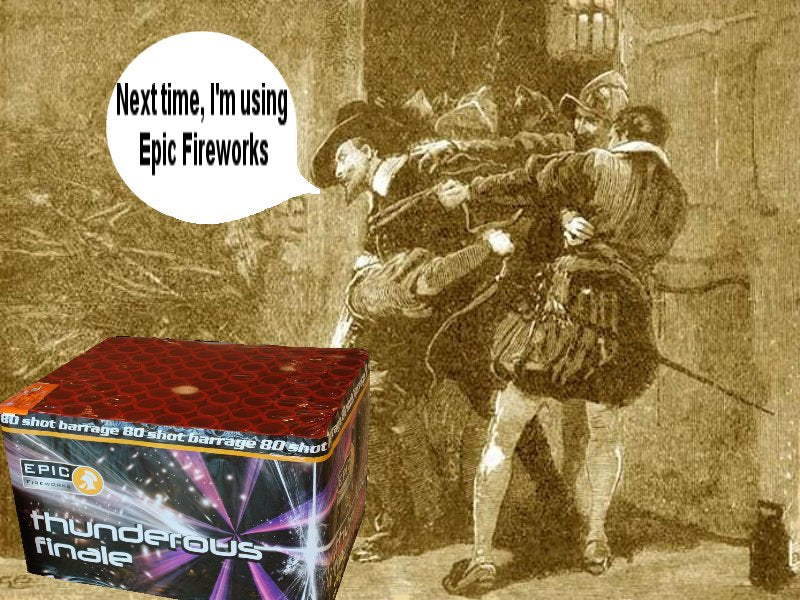
Plotters and Conspirators
Guy Fawkes was born in 1570 and though his father was a staunch Protestant, his mother married a second time into a strongly Catholic family. He went to St Peter's School at York (like his fellow plotters, the Wright brothers) and later became a soldier, fighting for the Spanish against the Dutch. Although not a senior officer, he gained a reputation for his technical expertise, and, on behalf of some of the English Catholics, he discussed with the Spanish an invasion of England.
In 1604 he was recruited by Hugh Owen to join the Gunpowder conspiracy and came to London. Catesby initiated him and Thomas Percy into his plans in May.
Once Percy had rented the house next to the House of Lords later that month, it was decided that Fawkes would pretend to be Percy's servant, and stay in the house. He adopted the false identity of John Johnson, and was closely involved in the business of digging a tunnel under the House of Lords and procuring gunpowder.
Once the cellar was rented, in the House of Lord's basement, the tunnel was abandoned. Fawkes went abroad during the middle of 1605, but was back in London in late October to finalise the plan, and was ready on 4th November to carry it out. When the basement was searched on that day Fawkes was found looking after a large pile of firewood. His explanations were initially accepted. But suspicions were subsequently aroused and in a second search later that evening, the gunpowder was found under the wood, and Fawkes was arrested.
Guy Fawkes was interrogated several times, but - to the admiration of government members, including the King - admitted almost nothing. The King authorised the use of torture on 6th November and his testimonies of 7th, 8th, and 9th November revealed much more information which the authorities used to begin to pick up some of the other conspirators. Fawkes was tried with the other surviving conspirators on 27th January 1606 and executed in Old Palace Yard, Westminster, on 31st January.
Robert Catesby was born in Warwickshire around 1572 to Roman Catholic parents with close links to many other Midlands Catholic families. His mother was a member of the Throckmorton family, who lived at Coughton Court.
Catesby was reputedly very charismatic and made friends easily - many of whom remained loyal and devoted to him. He was said to be a bit of a wild character in his younger days before he became strongly religious.
In 1601, along with the Wright brothers, Catesby was mixed up in the doomed rebellion of the Earl of Essex against the dominance of Robert Cecil. In the failed rebellion he was wounded, imprisoned, and fined. From then on he was viewed as a dangerous character by the government. He had, it seems, been involved in discussions with the Spanish government in 1602 about arranging a rebellion in England. He was one of many arrested as a precaution by the English government in 1603 after the death of Queen Elizabeth. Catesby formed the Gunpowder Plot, after having realised that the Spanish would not help the English Catholics. He disclosed it initially only to Thomas Winter and the brothers Christopher and John Wright then later to Guy Fawkes and Thomas Percy, in May 1604, at Catesby's lodgings in the Strand in London. Catesby, the driving force behind the Plot, recruited others in 1604 and 1605.
On the news of the discovery of the Plot, Catesby and several of his companions fled from London. He tried and failed to rally the Catholic gentry of the Midlands to join him in the rebellion before he reached Holbeach House in Staffordshire where they hid from the authorities. Several of the conspirators, including Catesby, were injured in an accident while trying to dry out their damp gunpowder.
Continues @ Epic Fireworks
